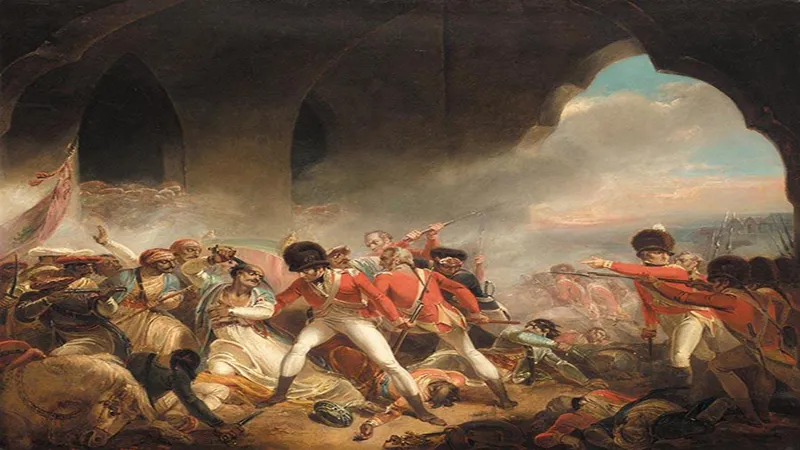The best way to understand what the Tipu Sultan controversy is all about is to see who is at the forefront of the protests against the observance of his birth anniversary - the Bajrang Dal, Vishwa Hindu Parishad and the Bharatiya Janata Party. Collectively the Sangh parivar has made a fine art of using historical grievances, real and imagined, for the purpose of political mobilisation.
History, is of course, a great place to look for wrongs. At some point or the other, every section of society has suffered at the hands of some other. Jains and Buddhists versus Hindus, Saivites versus Vaishnavites, Muslims versus Hindus, Brahmins and so-called lower castes, women, and of course, the perennial sufferer, the Dalit.
If history is your guide, there can be no peace in the world. The Chinese must fight the Japanese, the Russians cannot have peace with the French and the Germans, the British must finish off the French and the whole world must stamp out the Mongols.
Applying modern norms and beliefs to medieval events is a mugs game, but it's a very useful one in contemporary Indian politics. After all, the sangh parivar successfully convinced the masses that Lord Rama was actually born in our world at a place called Ayodhya and at the very spot where the Babri masjid stood, in the process harvesting considerable political dividends for the BJP.
Now, the target is Karnataka and in Tipu Sultan the sangh believes it has found a convenient villain.
Let's be clear, by the standards of today, the Tiger of Mysore was hardly loveable: he could chop off the heads of those he did not like, torture them, issue commands that had to be obeyed at the pain of death. But so could all rajas and sultans. In India and other countries around the world.
Historical personalities have to be seen in the context of their times, where war was the norm and in fighting such wars, there were no holds barred. There were no Geneva Conventions limiting war, everything was permitted and everything happened -murder, massacre and mayhem. Tipu, at various times fought the British, the Marathas, the Nizam of Hyderabad, even as he sought to consolidate and expand his kingdom at the expense of the rulers of Travancore and Coorg. The latter was a particularly difficult campaign which became a guerrilla war which even to this day, tends to be fought in a "dirty" way.
A lot that has been written negatively about Tipu comes from British sources. They were, of course, his bitterest enemies. Tipu challenged the British on land, at sea and even sought to ally with the French against them. He was eventually defeated and killed. Those who won produced histories that favoured themselves.
Tipu's kingdom was no democracy, he was a sultan with ambitions of becoming a badshah; he was a devout Muslim and viewed his kingdom as an Islamic entity. But, as historians have repeatedly pointed out, his handling of the Malabaris and Kodavas was part of the almost continuous contest for power between warring kingdoms. The killing of defeated adversaries, forced conversions and destruction of temples were all with the view to establishing his authority. Historians have also pointed out the grants and support of temples and Mutts by Tipu, his unIslamic penchant for astrology. Tipu employed many Hindu ministers. The ambiguity of contemporary statecraft is best brought out by the incident in which Tipu provided aid to the Sringeri Mutt after it had been raided and sacked in 1791 by a Maratha army. The point is that Tipu lived in his times, and it is ahistorical - and eventually foolish - to judge him by the standards of today.
Were the Sangh parivar to do so uniformly, it would have to ask Prime Minister Modi to cancel his visit to the United Kingdom. Through the period of their rule in India, the British were responsible for many atrocities. Unfortunately, most Indians have forgotten what the "civilised" British officers, Colonels James Neill and Henry Havelock did in Delhi and, especially Lucknow and Allahabad, following the failure of the Great Rebellion. Even in the 20th century, the British carried out terrible atrocities, remember Jalianwalla Bagh?
There can be little doubt that Tipu Sultan was a striking historical figure and for that reason alone, Karnataka is right in observing his birth anniversary. The opposition that is being manifested is rooted in contemporary politics. After all, why did we not see it in earlier times - say the 1920s, or the 1950s and 1970s?
Grievance history is not unique in the world, and neither are its uses as is evident from Chinese policy with regard to Japan. It is a useful tool of political mobilisation and shaping national identities. But the sangh parivar's effort to change Indian national identity to an exclusively Hindu one is fraught with all manner of danger for the simple reason that it will trigger a counter-grievance of those left out of its pale.
Our founding fathers gave us an "Indian" identity, one which was forged in the freedom struggle and tempered by its opposition to a movement seeking an exclusive identity for the country's Muslims. A similar demand for exclusive identity cannot now be sought for the country's Hindus without shredding to bits the compact of 1950, also known as the Constitution of India.
(The writer is a Distinguished Fellow at Observer Research Foundation, Delhi)
Courtesy: www.thewire.in
The views expressed above belong to the author(s). ORF research and analyses now available on Telegram! Click here to access our curated content — blogs, longforms and interviews.




 PREV
PREV


